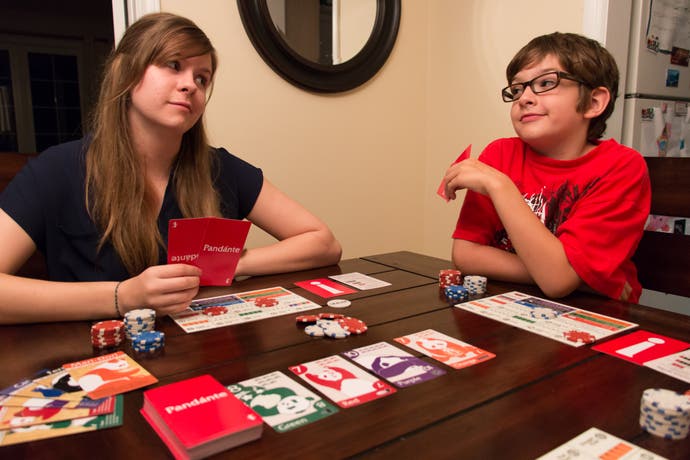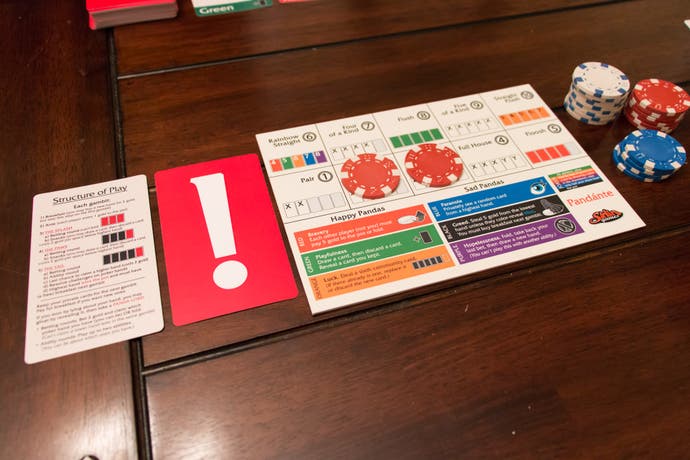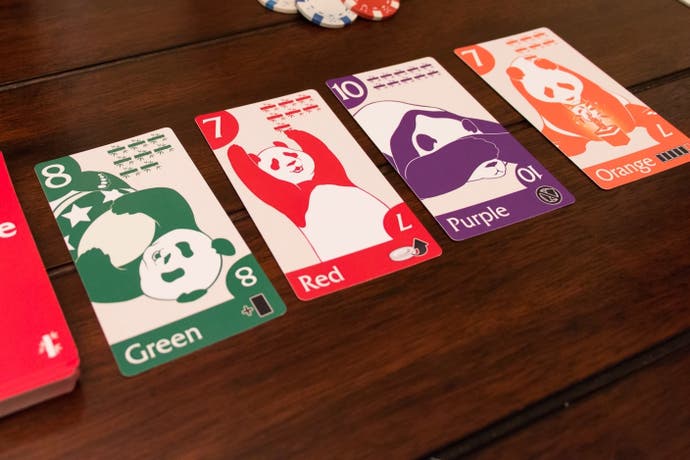Gambling with pandas might be better than gambling with money
Liar's poker.
What do you do after you fix chess? You fix poker, apparently. Not that this was game designer David Sirlin's intention with Pandante, his Kickstarter-funded card game, of course. In fact, all he initially wanted to do was create a game about lying - more specifically, a game about lying pandas.
"I didn't set out to solve any problems with poker, or to even think much about poker," Sirlin tells me over email. "I set out to make a game that used a certain bluffing mechanic - the idea that if you lie about something and no one calls you out, then you get to have it for real."
With that aim in mind, Sirlin took the basic structure of Texas Hold 'Em as a starting point. In Pandante, as in Hold 'Em, each player is dealt two cards of their own and shares three community cards with any other players. A further two cards are later added to the community pile, and the objective is to make as good a five-card hand as possible, betting on its value along the way. The Sirlin twist is that, at regular stages in a Pandante gambit, each player places bets on a board publicly declaring exactly the kind of hand that they hold. And they can lie about this. You'll want to lie, in fact, because there are bonuses for the player who claims to have the best hand at any one moment. You may want to think twice about lying, though, because there are also risks attached. You cannot reduce the quality of the hand you've said you have as the game proceeds - and the chances of getting caught only increase over time.

That's Pandante's basics, then, although there are also special abilities you can use. There's also a big red card you get to hold up at the end of the gambit if you want to challenge the person that says they have the most valuable hand and see whether he or she was lying about it. The penalties for getting caught in a lie are steep. So are the penalties for accusing someone who was telling the truth.
If it's this relentless focus on lying that defines Pandante, it's also the reason that Sirlin's had to put in various tweaks that might improve some standard forms of poker too. In poker, there's a lot of folding and a lot of player elimination. That's all well and good when you're in Vegas hoping to earn enough money to buy one of those crystal swans that people on Cribs keep in their bathrooms, but it's not much fun for a lot of recreational gamblers. What's the pleasure in bluffing when there's no one left to bluff?
"What you need are incentives against folding," says Sirlin. "And Pandante has a whole lot of them. In Pandante, you can get extra cards along the way, so even a bad hand can become a good one if you keep going. Also, the probability distribution of hands is much different than in human poker."
Pandante has additional hands for starters - as an example, four cards of the same colour gives you a Floosh - and this means you have a much higher likelihood of getting a playable hand of some sort. On top of that, there are those abilities in the mix that you only get to try out if you stay until the end.
"That's definitely more bait to keep going," says Sirlin. "And, interestingly, one of those abilities is like a super fold that gives you a better chance at a good hand next gambit. So even if you are planning to fold, sometimes you want to keep playing until nearly the end of the gambit so you can do that super fold. And by then maybe you have a good enough hand to stay in anyway. [Beyond] all that, there's the lying mechanic the game is based on. It's rigged so that lying is a little extra good, and that means you're more able to stay in even with a weak hand than you'd otherwise be able to. This folding thing is quintuply addressed at the very least."

Sirlin also took a look at the problem of player elimination. "Sometimes that's necessary to make a game work, but it's good to avoid it if you can," he argues. "I addressed this same problem a long time ago in the playtest version of my customizable card game Codex. In that game, there's a free-for-all mode where at the moment one player loses, the player with the least damaged base wins the game. So there's never a time where one player is sitting out, waiting for the rest to finish. I did the same thing for Pandante too.
"Playtesting showed it didn't work right in Pandante though," he continues. "In [Codex], you have more control over what's happening to other players than you do in Pandante. If someone is losing money and getting close to triggering that end-of-game condition, you can't really stop them from losing money. So sometimes you'd lose suddenly and it was way too far out of your control. Even worse, you could be so far behind that you know for sure you can't win enough to beat the top player in the one or two gambits left before the lowest player busts."
Sirlin's solution? Fairies. "The fix was to flip it around and say the game ends whenever any player gets more than X money. When you bust, that no longer ends the game. Instead, a magic gold fairy gives you free money to cover your debts and refill you back to 20 gold. You have to sit out for one gambit to frolic with the fairy if she helps you though, so that drawback is enough that most people play responsibly enough to avoid it."
The gold fairy won't be turning up in Pandante's real money mode, of course, but with its colourful cards, its bright graphical style and its endearing terminology, Sirlin's made a gambling game that's legitimately thrilling without the hovering threat of your personal economic apocalypse - a gambling game where even fake money defeats come with a satisfying bite.
Poker was never really broken, then, but it's still worth thinking of new ways to keep players entertained as well as engaged. It's still worth asking yourself: yes, but what would the pandas do?
Pandante's now available to back on Kickstarter - and it's recently been successfully funded.

